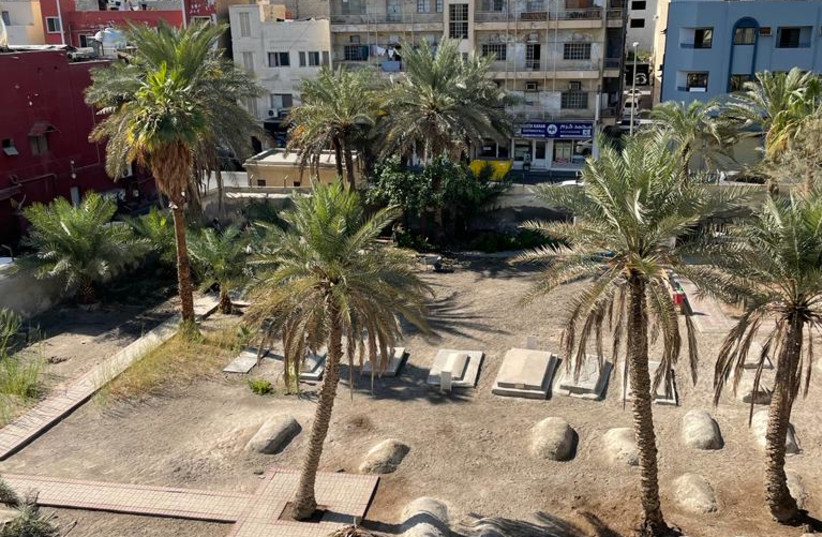The Association of Gulf Jewish Communities (AGJC) has launched a project to renovate, maintain and finance the only Jewish cemetery in the six Gulf Cooperation Council nations, located in the Bahraini capital, Manama.
The initiative kicked off with the Jewish holiday of Tu B’Shevat, which began on Sunday night. The last person buried in the cemetery was businessman Rubin Daoud Rubin, who died in 2016 at the age of 61 and was laid to rest according to the Sephardic custom.
Most of the Jewish community in Bahrain came from Iraq and Iran at the end of the 18th century. They settled in the Al-Hatab neighborhood in the center of Manama.
“The cemetery, which is more than 100 years old, needs permanent funding,” Ebrahim Dawood Nonoo, president of the AGJC, chairman of the Board of Trustees of The House of Ten Commandments synagogue, and head of the Jewish community in Bahrain, told The Media Line.
“We aim to provide all means of daily life and all the needs of the Jews in the Gulf … in accordance with all their customs and religious ways, and we also seek to provide all the religious rituals required for the Jews in the Gulf region,” he said.

More than 800 Jews lived in Bahrain in the 1930s and 1940s, Nonoo said, and they supported a synagogue and a cemetery.
“After they left the area, there was no longer a great need for them [the institutions], but they continued to operate, and now they must work on continuity for future generations as well,” he said.
“Today Jews are present [in Bahrain and the wider Gulf], and we want the cemetery to exist as well. The synagogue is there and there is no need for it to be expanded. The area of the cemetery is large, and it is in the middle of Manama. We do not need to expand it, but we need to ensure its sustainable work in the future,” Nonoo added.
The community plans to create an endowment along the same lines as the wakf trust that operates in the Muslim religion.
“The aim of this is to take care of everything related to the Jewish religion in Bahrain, but the matter needs time,” he said.
“There is a possibility to donate to the cemetery from outside Bahrain, and there are many Jews, whether of Bahraini origin or not, who are willing to donate to this cemetery,” Nonoo stressed.
“We are not aiming for a specific amount, but there should be sustainability and permanent donations for this cemetery so that it can serve the Jews in the Gulf during the coming generations. On Sunday, I will plant a tree to bring the place back to life, and I hope that we will get donations.”
Nonoo said the Jewish community of Bahrain numbers about 80 people, and that there are about 1,000 Jews living in the United Arab Emirates. “All of them need such places, and the cemetery will be used for any Jew in the area,” he said.
“The cemetery sees hundreds of visitors every year and, after the signing of the peace agreements, there were more visitors. Last month, there were 50 visitors, all of them from the family of Shimon Cohen, the founder of the Jewish synagogue in Bahrain,” Nonoo said, referring to the Abraham Accords, signed between Israel and the United Arab Emirates and Israel and Bahrain in September 2020.
Rabbi Cohen, who came from Iran, founded the Bahrain synagogue in 1935.
Cohen had many children and grandchildren, some of whom said that they would settle in Bahrain if they got a job there, Nonoo said.
“Bahrain is close to all religions, and here the people are respected, and everyone respects the other. For example, we are on Sheikh Abdullah Street in the center of Manama. All the merchants who worked in the trade with India lived here, including Jews, Muslims and other religions. There is no difference between them,” he said. “Neither socially nor financially, there is no discrimination,” he added.
“I told the grandchildren of the Cohen family that whoever has investments should come to Bahrain, there is a great potential for investment and work here, and the field is open to Israelis, especially after the peace agreements,” Nonoo stressed. “No one here is being harassed, whether by the government or by the people. Everyone is comfortable in Bahrain.
“When we are in the synagogue on Saturday, there are Muslims who visit us and perform prayers with us, and they also feel that Judaism is a religion close to them, because the Ten Commandments found in the Torah are also found in the Quran,” he said.
“We are lucky that we live in Bahrain; everyone respects the other,” Nonoo said.
The Jewish community in Bahrain owns many commercial activities, most notably Roubens Store, which is the oldest watch and electronics outlet in Bahrain, and the Nonoo family has many investments in the field of money transfer and financial activities.
